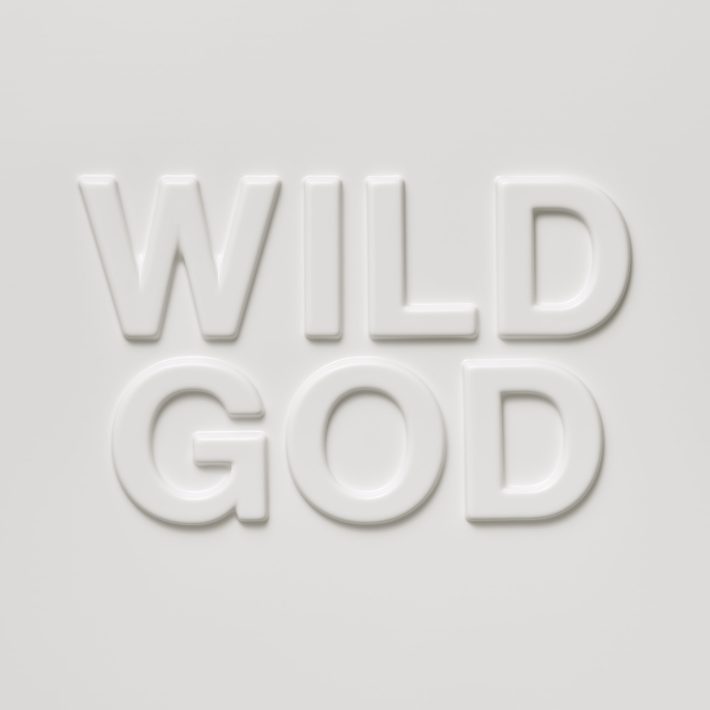- Bad Seed Ltd./Play It Again Sam
- 2024
Nick Cave is no stranger to ecstasy. Maybe that's not the first word you'd associate with him, given all the macabre tales told and villains played in his chaotic youth, or the wise gravity of his late career work. Yet all along the way, there would be rapture in the face of unknown powers beyond us, in the face of a woman, even in the face of loss. Through his music (and in his own life), Cave has traveled through the murk, dove deep into squalor, and yet somewhere in long dark corridors seeking salvation, he was always able to revel in some form of beauty or another. Decades ago, Nick Cave's ecstasy would've looked different — laughing with a mouth full of blood, hoovering drugs, wild-eyed. On their 18th album, Wild God, Nick Cave And The Bad Seeds present something that, in their world, is altogether more shocking: happiness.
When Ghosteen arrived in 2019, Cave characterized it as the end of a trilogy begun with 2013's Push The Sky Away. This was when the Bad Seeds morphed into something more atmospheric, wrangling with encroaching mortality on Push The Sky Away and then death and grief across 2016's Skeleton Tree and Ghosteen. Cave had reached a new level or prominence and acclaim, and taken on a whole different public persona as he openly communed with fans after the tragic loss of his son. But at a certain point, the grief narrative became overbearing, as if that was all Cave could stand for in his elder statesman years. So, too, had the musical experimentation been pushed to outer limits — the synth tendrils and vaporous arrangements of Ghosteen a gentle ascension after which the only answer would be to return to earth, forever altered by the journey.
In 2021, Cave released another album, Carnage. The first non-score album billed to Nick Cave & Warren Ellis, it was effectively a quarantine album, thematically emerging from the pandemic and the chaos of 2020 while acting as a loose post-script to the recent Bad Seeds trilogy. Cave knew whatever came next would be different. On New Year's Day in 2023, he sat at his desk with a totally blank canvas — no ideas, no lyrics, no direction for the next album. The only set part of the plan was he wanted the Bad Seeds back, and he wanted them back "unchained… and free" after the quieter textures of Skeleton Tree and Ghosteen.
Cave spent three months writing lyrics, and then gathered the band for a three-day writing session in London. After another four-day session, the album was basically done. It included the reintroduction of drummer Thomas Wydler, now able to play again after nursing himself back to health, which Cave cited as a particular engine of rejuvenation for the band overall. Radiohead's Colin Greenwood, who had recently played on one of Cave's solo tours, also contributed some bass. Cave and Ellis then took the material to producer Dave Fridmann, who mixed one track a day for 10 days straight.
It all has the sound of immediacy, of loose and unlabored inspiration. Accordingly, any quote from Cave describing the album is palpably excited. He calls it a "joyful record… bursting with life," and describes it as throwing its arms around the listener. "The sheer exuberance… just put a big fucking smile on my face." You get the idea. Nick Cave And The Bad Seeds are in a very different place than where we left them.
We rely on reader subscriptions to deliver articles like the one you're reading. Become a member and help support independent media!
This sense of wonder was evident in Wild God’s early singles, its title track and "Frogs." "Wild God" surged forth to the sort of climactic refrain the Bad Seeds had often saved for live reinterpretations of songs like "Jubilee Street." "Frogs" continued apace from there — gliding, glistening, a revery built on small moments from a walk home. Those songs were indicative of the stylistic territory that defines much of the album. The majestic racket of the latter-day Bad Seeds gets filtered through the celestial tones of Ghosteen. All of Cave's claims about the album — exuberance, embrace, bursting from the speakers — ring true.
The tagline of "the Bad Seeds, unleashed" might be misleading, though. You can already imagine how gigantic some of these songs will feel onstage, but this music still relates more to the mellowed sound of the last three Bad Seeds records rather than the fire-breathing rock days of yore. Instead, what you hear with the band back together is an unabashed dedication to intimate beauty and a weathered euphoria. There are welcoming synth clouds, sweeping strings, and a good few choral arrangements swelling up around Cave's trademark gravel. Even when the album calms down in its second half, the reflective piano-driven tracks "Cinnamon Horses" and "Long Dark Night" feel less weighted than semi-recent predecessors. "O Wow O Wow (How Wonderful She Is)" remembers Cave's former girlfriend and collaborator Anita Lane,who died in 2021, with warmth and humor — vocoder vocal coos lead the way to a phone recording of Lane brightly reminiscing on their younger days. By the end, Wild God’s aesthetic feels like Nick Cave And The Bad Seeds' cosmic gospel.
Cave has called Wild God "songs of conversion." Wrangling with faith and God has long been a thread in Cave's work, convulsing in this direction or that depending on the era. But what's communicated, both lyrically — Cave's recent penchant to combat suffering by locating solace in fleeting moments defines these songs — and musically, is a different kind of willingness, a surrender. This is most obvious in centerpiece "Conversion," which erupts halfway through as a choir repeatedly references being "touched by the spirit." Wild God basically concludes with a hymn, Cave and a choir singing of "Peace and good tidings" arriving to the land.
There is one place where grief still rears its head. "Joy" concludes the fanfare of Wild God’s opening stretch with a long, free-form vision, Cave intoning over distant synth flickers and a lone, clear French horn. “I woke up this morning with the blues all around my head/ I felt like someone in my family was dead," he sings early on. Then, a "wild ghost" visits him, and he questions why, why can't he be left alone. This ghost — a "flaming boy," "in giant sneakers, laughing stars around his head" — delivers a message: "We've all had too much sorrow, now is the time for joy."
For all the resilience present in Skeleton Tree and Ghosteen, a different power courses through Wild God. No longer are moments of connection and love the vibrant, desperate anchors in the maelstrom. These are now the point in of themselves. "Joy" sneakily becomes Wild God’s defining moment, a song that gives Cave, the band, the listeners — all those of us living — permission to really live.
Perhaps this will be too simple for some longtime Cave fans, even with the conflicts and questions strung through the album. Cave's writing is still far from unthinking contentment: His work here is as rich and nuanced as we've come to expect throughout his career and especially since the evolution kicked off by Push The Sky Away. Similarly, these 10 songs might not be as shocking a stylistic overhaul as, say, Skeleton Tree, but the timbre is not quite like anything we've heard from the Bad Seeds before.
All of this serves to make Wild God a poignant, forceful statement. Cave has rallied the Bad Seeds around him, so they can find a way forward together. Cave knows all too well you can't shake the past, but what makes Wild God stand out as the beginning of a new chapter is, for the first time, how Cave has found a way to make music on the other side of the traumas and loss he documented so well. He's talked about opening up, about acceptance; Wild God is the sound of it. Forty years in, with all of the apocalyptic and mournful and seething Nick Caves we once knew, it may be one of his most radical pivots yet.
Wild God is out 8/30 via Bad Seed Ltd./Play It Again Sam.







